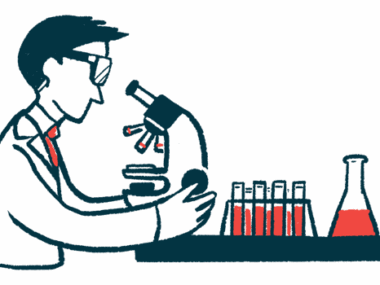MEK inhibitor IMM-1-104 shows promise in pancreatic cancer: Data
Phase 2a trial data point to treatment's potential as first- or second-line treatment
Written by |

Investigational oral therapy IMM-1-104 was well tolerated and showed early signs of efficacy as a first- or second-line treatment for pancreatic cancer.
That’s according to data from three separate arms of a Phase 2a trial (NCT05585320), which is evaluating IMM-1-104 alone (monotherapy) or as part of combination treatment regimens in people with pancreatic and certain other cancers. The trial may still be recruiting participants at sites in the U.S.
Developer Immuneering said that additional trial data are expected in the second quarter, and that it’s starting to plan for a pivotal Phase 3 clinical trial of the experimental treatment in people with advanced pancreatic cancer. “We believe these results provide substantiating evidence of IMM-1-104’s contribution in combination with current therapies,” Ben Zeskind, PhD, CEO of Immuneering, said in a company press release.
Many types of tumors, including those seen in pancreatic cancer, are characterized by abnormal activation of a signaling pathway called RAS/RAF/MEK that’s believed to help tumors grow and spread. Around 30% of cancers, and 95% of pancreatic cancers, are driven by mutations in the RAS gene family, which are involved in this signaling pathway.
IMM-1-104 is an oral MEK inhibitor, which aims to reduce activation of the RAS/RAF/MEK pathway in order to slow cancer growth. While there are other MEK inhibitors on the market, they’re limited by tolerability issues or are only intended for subsets of patients whose tumors have certain mutations. Immuneering believes IMM-1-104 has the potential to overcome these limitations.
On the fast track
The treatment has received fast track designation in the U.S. as a first- or second-line treatment for pancreatic cancer, as well as orphan drug status for pancreatic cancer. These designations are intended to speed the therapy’s clinical development.
‘We are setting a path to break new ground in indications where no MEK inhibitors have been approved, including pancreatic cancer, and aim to provide a better tolerated and more effective alternative where MEK inhibitors are already helping patients,” Zeskind noted.
The ongoing clinical trial is testing IMM-1-104 in adults with certain types of solid tumors, including people with pancreatic ductal adenocarcinoma (PDAC), the most common type of pancreatic cancer.
PDAC participants had tumors that were locally advanced and unresectable (meaning the cancer has spread to nearby tissue and surgery is not an option) or metastatic, meaning it had spread more broadly to other areas of the body.
As of a cut-off date of Dec. 5, the three trial arms involving pancreatic cancer patients had enrolled more than 75 participants. The recent analyses included patients who had received their first dose of treatment at least 14 weeks before the cut-off.
In one trial arm, participants were given first-line treatment with daily IMM-1-104 (240 or 320 mg) along with a modified regimen of gemcitabine with nab-paclitaxel (GnP), a standard chemotherapy regimen used in pancreatic cancer.
Data showed that the overall response rate (ORR) was 43%, with three of seven treated patients achieving partial or complete cancer shrinkage. Six of the seven participants (86%) achieved controlled disease, where the cancer has shrunk or remained stable. Benchmark data from a Phase 3 trial testing mGnP alone as a first-line pancreatic cancer treatment was associated with an ORR of 23% and a disease control rate 48%.
In another arm, patients were treated with a combination of daily IMM-1-104 (240 mg) along with a modified regimen of FOLFIRINOX as a first-line treatment. FOLFIRINOX is a combination of four chemotherapy agents – leucovorin (folinic acid), fluorouracil, irinotecan hydrochloride, and oxaliplatin.
All four evaluable patients achieved a shrinkage of their target tumors and disease control. One person saw a 100% reduction in their tumor, which Zeskind said is “a rare event in this patient population.”
The final arm of the Phase 2b trial tested once daily IMM-1-104 monotherapy (320 mg) as a second-line treatment in pancreatic cancer patients. Results showed that 11 of 21 treated patients achieved disease control, including ten people with stable disease and one person who experienced a 67% shrinkage in their target tumor.
The therapy showed a good tolerability profile across treatment arms, with common side effects including diarrhea, fatigue, and nausea.
“Having demonstrated compelling activity in both the combination and monotherapy settings for pancreatic cancer, the emerging tolerability profile for IMM-1-104 is also highly promising,” said Brett Hall, PhD, chief scientific officer of Immuneering. “The maturing safety profile for IMM-1-104 gives us confidence that Immuneering may have developed a better tolerated MEK-inhibitor,” Hall said.
The trial is also testing IMM-1-104 as a monotherapy in people with melanoma or non-small cell lung cancer that’s positive for RAS gene mutations. The company plans to launch three new trial arms this year testing combination therapy regimens in these patient groups.
Although plans for a Phase 3 trial in pancreatic cancer are not set, the proposed trial would test IMM-1-104 in combination with the modified GnP regimen against standard of care chemotherapy as a first-line treatment for PDAC patients with locally advanced or metastatic disease.




